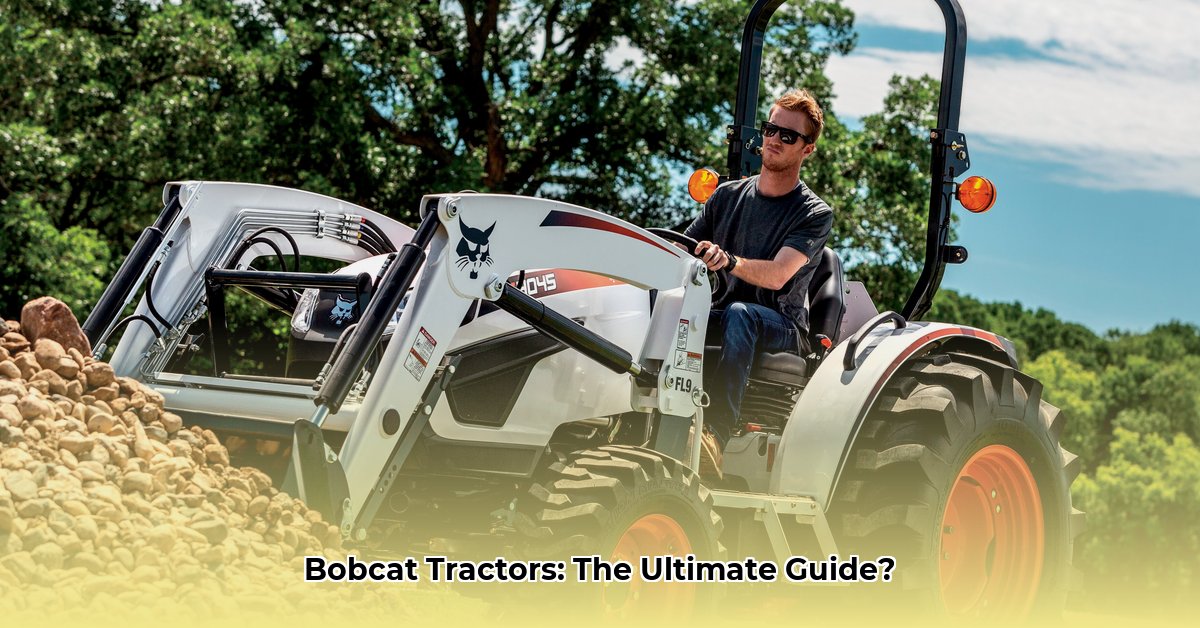
Choosing the right compact tractor can be overwhelming. This review focuses on Bobcat compact tractors, evaluating their strengths, weaknesses, and comparing them to industry leaders like Kubota and John Deere. Whether you're a homeowner, landscaper, or small farmer, this guide will help you decide if a Bobcat is the right fit. For more information on Bobcat's manufacturing, check out this helpful resource.
Bobcat Tractor Strengths: Built to Last, Easy to Use
Bobcat compact tractors stand out for their robust build quality. Owners consistently praise their durability and reliable performance, even in challenging conditions. This ruggedness translates to a longer lifespan, potentially saving you money in the long run. Beyond durability, Bobcat's user-friendly design is a significant advantage. Many models utilize hydrostatic transmissions, resulting in smooth operation and intuitive controls, making them accessible even to novice operators. Furthermore, Bobcat often includes premium features as standard equipment, such as cruise control and adjustable seats, enhancing both functionality and operator comfort. Their compact size provides excellent maneuverability, ideal for navigating tight spaces.
Bobcat Tractor Weaknesses: Considerations Before Purchase
While Bobcat tractors offer numerous advantages, potential buyers should be aware of certain limitations. The model selection is smaller compared to competitors like Kubota and John Deere, potentially limiting options for specialized tasks or specific power needs. Pricing can also be a consideration, as Bobcat models often fall into a higher price range. While justified by their robust build and included features, budget remains a critical factor. Regular maintenance is crucial to ensure the longevity of these machines, with the hydrostatic transmission requiring periodic servicing. Lastly, regional variation in the accessibility of Bobcat dealerships might impact service and parts availability.
Risk Assessment and Mitigation
Potential risks associated with Bobcat tractors primarily revolve around the hydrostatic transmission and the importance of regular maintenance. Mitigation strategies include adhering to the manufacturer's recommended service schedule, using only approved fluids and parts, and promptly addressing any unusual noises or performance issues. Addressing these potential problems proactively minimizes the risk of costly repairs.
Bobcat vs. Kubota and John Deere: A Detailed Comparison
To effectively evaluate Bobcat tractors, comparing them to industry leaders Kubota and John Deere is essential. While Kubota and John Deere offer a wider range of models catering to diverse needs and budgets, Bobcat often provides more standard features, enhancing value. The following table highlights key differences:
| Feature | Bobcat | Kubota | John Deere |
|---|---|---|---|
| Model Variety | More Limited Selection | Extensive Range | Extensive Range |
| Standard Features | More Generous | Varies Widely by Model | Varies Widely by Model |
| Maneuverability | Excellent | Good | Good |
| Price | Generally Higher | Competitive, Varies by Model | Competitive, Varies by Model |
| Engine Types | Primarily Diesel | Diesel and Gasoline | Primarily Diesel |
| Typical Horsepower Range | Varies by model; generally mid-range | Wide range, from entry-level to high-power | Wide range, often higher horsepower in comparable models |
Choosing the Right Bobcat Tractor: A Buyer's Guide
Selecting a compact tractor requires a methodical approach. Begin by outlining your specific needs. Consider the size of your property, the tasks you expect to undertake (tilling, mowing, hauling), and your budget. Carefully analyze the size and weight capacities of available models in relation to your terrain and planned applications. Compare Bobcat's standard feature offerings against the broader model selections and price points of Kubota and John Deere. Factor in long-term maintenance, repair costs, and warranty coverage into your budget. Explore financing options to alleviate the initial financial burden.
Regulatory Compliance and Safety
Operating any compact tractor requires adherence to local safety and emissions regulations. Always ensure your chosen model complies with all relevant laws and standards in your region. Prioritize safe operating procedures and regular maintenance to minimize risks and ensure compliance.
Conclusion: Is a Bobcat Right for You?
Bobcat compact tractors present a compelling option for those seeking a durable, user-friendly machine with a generous selection of standard features. Their robust construction and ease of use are significant advantages. However, potential buyers must carefully consider the more limited model range and higher price point. Ultimately, the best compact tractor depends on individual needs, budget, and intended applications. Thorough research, comparison shopping, and test drives are crucial before making a final decision.